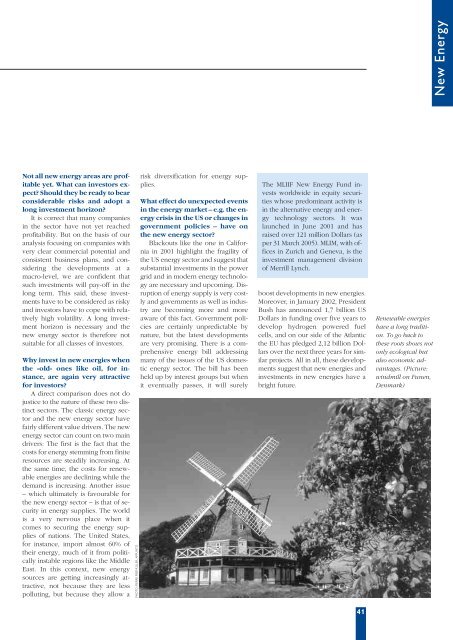Denaris - Administration
Denaris - Administration
Denaris - Administration
Sie wollen auch ein ePaper? Erhöhen Sie die Reichweite Ihrer Titel.
YUMPU macht aus Druck-PDFs automatisch weboptimierte ePaper, die Google liebt.
Not all new energy areas are profitable<br />
yet. What can investors expect?<br />
Should they be ready to bear<br />
considerable risks and adopt a<br />
long investment horizon?<br />
It is correct that many companies<br />
in the sector have not yet reached<br />
profitability. But on the basis of our<br />
analysis focusing on companies with<br />
very clear commercial potential and<br />
consistent business plans, and considering<br />
the developments at a<br />
macro-level, we are confident that<br />
such investments will pay-off in the<br />
long term. This said, these investments<br />
have to be considered as risky<br />
and investors have to cope with relatively<br />
high volatility. A long investment<br />
horizon is necessary and the<br />
new energy sector is therefore not<br />
suitable for all classes of investors.<br />
Why invest in new energies when<br />
the «old» ones like oil, for instance,<br />
are again very attractive<br />
for investors?<br />
A direct comparison does not do<br />
justice to the nature of these two distinct<br />
sectors. The classic energy sector<br />
and the new energy sector have<br />
fairly different value drivers. The new<br />
energy sector can count on two main<br />
drivers: The first is the fact that the<br />
costs for energy stemming from finite<br />
resources are steadily increasing. At<br />
the same time, the costs for renewable<br />
energies are declining while the<br />
demand is increasing. Another issue<br />
– which ultimately is favourable for<br />
the new energy sector – is that of security<br />
in energy supplies. The world<br />
is a very nervous place when it<br />
comes to securing the energy supplies<br />
of nations. The United States,<br />
for instance, import almost 60% of<br />
their energy, much of it from politically<br />
instable regions like the Middle<br />
East. In this context, new energy<br />
sources are getting increasingly attractive,<br />
not because they are less<br />
polluting, but because they allow a<br />
PHOTO: PIERRE FREIMÜLLER, APPUNTO<br />
risk diversification for energy supplies.<br />
What effect do unexpected events<br />
in the energy market – e.g. the energy<br />
crisis in the US or changes in<br />
government policies – have on<br />
the new energy sector?<br />
Blackouts like the one in California<br />
in 2001 highlight the fragility of<br />
the US energy sector and suggest that<br />
substantial investments in the power<br />
grid and in modern energy technology<br />
are necessary and upcoming. Disruption<br />
of energy supply is very costly<br />
and governments as well as industry<br />
are becoming more and more<br />
aware of this fact. Government policies<br />
are certainly unpredictable by<br />
nature, but the latest developments<br />
are very promising. There is a comprehensive<br />
energy bill addressing<br />
many of the issues of the US domestic<br />
energy sector. The bill has been<br />
held up by interest groups but when<br />
it eventually passes, it will surely<br />
The MLIIF New Energy Fund invests<br />
worldwide in equity securities<br />
whose predominant activity is<br />
in the alternative energy and energy<br />
technology sectors. It was<br />
launched in June 2001 and has<br />
raised over 121 million Dollars (as<br />
per 31 March 2005). MLIM, with offices<br />
in Zurich and Geneva, is the<br />
investment management division<br />
of Merrill Lynch.<br />
boost developments in new energies.<br />
Moreover, in January 2002, President<br />
Bush has announced 1,7 billion US<br />
Dollars in funding over five years to<br />
develop hydrogen powered fuel<br />
cells, and on our side of the Atlantic<br />
the EU has pledged 2,12 billion Dollars<br />
over the next three years for similar<br />
projects. All in all, these developments<br />
suggest that new energies and<br />
investments in new energies have a<br />
bright future.<br />
41<br />
Renewable energies<br />
have a long tradition.<br />
To go back to<br />
these roots shows not<br />
only ecological but<br />
also economic advantages.<br />
(Picture:<br />
windmill on Funen,<br />
Denmark)<br />
New Energy






